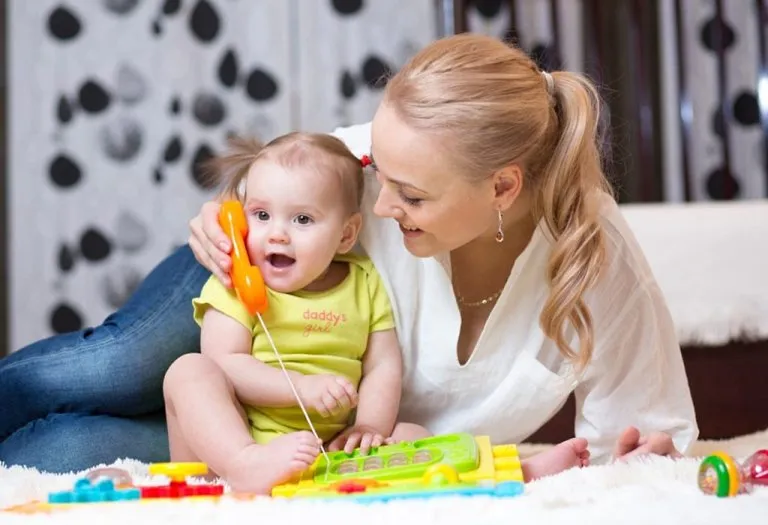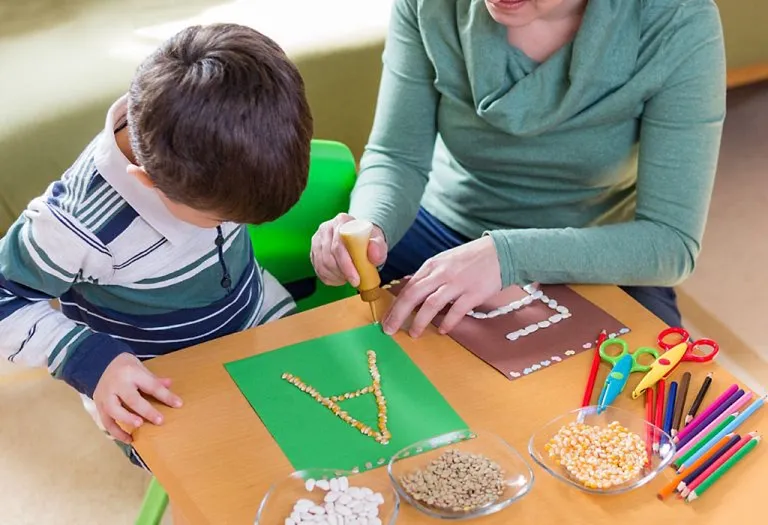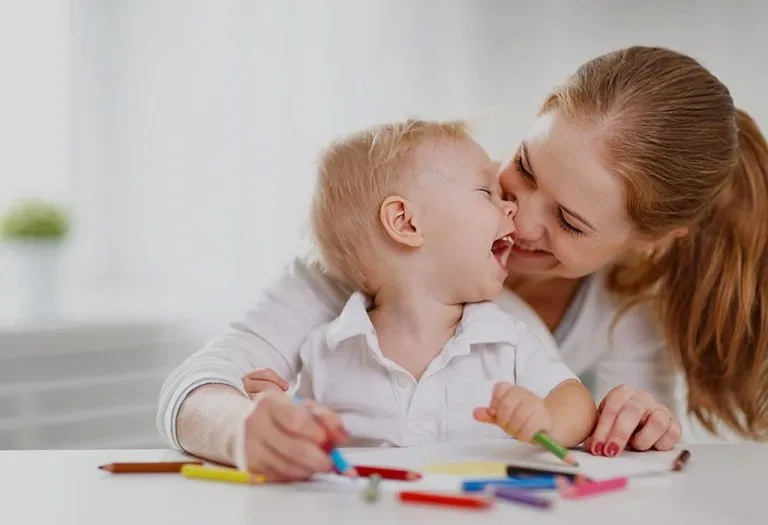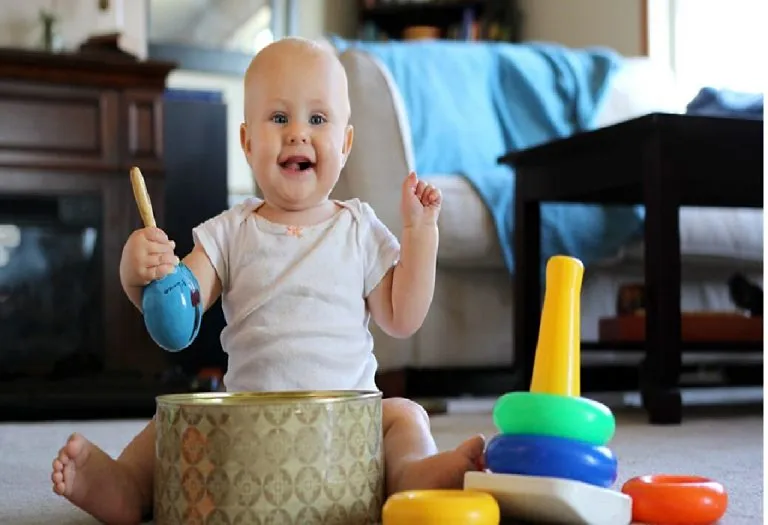How to Teach a Toddler to Talk – Effective Tips for Parents
The time has come. Your tiny terror’s babble should now be morphing into words, and you’re wondering how to help them along. Well, much like the entire parenting process, it’s long and immensely rewarding. Teaching toddlers to talk is a milestone that requires patience, consistency, and plenty of encouragement (1). Every child develops at their own pace, but there are simple ways to nurture their language skills. Getting your toddler to talk is a rewarding experience. It may take time, but it’s worth the wait! Most importantly, celebrate every attempt they make, as positive reinforcement boosts their confidence.
Simple Tips and Activities to Help Your Toddler Talk
First things first, remember your toddler is different and has their own approach to everything. You need to be supportive and tailor every step to their development (2). If they take a little longer, don’t stress. They’ll get there in their time.
Here’s how to teach a toddler to talk and have fun along the way (3):
1. Friendship
The best way to encourage your toddler is to become their friend. Though there are many ways to get your toddler to talk, it must be noted that none will work if they’re not interested. Engage in their playtime and talk to them on a daily basis as you interact with them. This involves everything from bathing to feeding. You are their gateway to the world of speech, and if you want them to step through, you better be one entertaining gatekeeper – this goes for mommies and daddies!
2. Repetition
Wondering how to encourage your toddler to talk? Repetition is key. Constantly repeat words and associate them with objects visually. For example, during breakfast, have them next to you on the counter and show them different items while saying their names. During playtime, as you pass them the ball, say, ‘This is a ball. Yes, this is your ball.’
3. Enunciate
They can also watch sounds so stress on the right sounds. Put on shows that build on this particular skill. Your child can learn the word through visual association. In addition, their enunciation will improve based on watching how you say the word. Remember, you’re the gatekeeper, so correct their pronunciation.
4. Opportunity
Give your toddler the chance to talk every opportunity you have. Their incessant babble must now become incessant chatter with intelligible words. Hand them to every adult who’s willing to talk (make sure the adult is vetted!) and let the conversation flow. Make sure you expose them to new situations.
5. Activities
Activities are a good place to expand their horizons. They get to see a lot more and these conversation opportunities suddenly quadruple. Your toddler now has access to a rich world and will develop a rich vocabulary. You could take them to the municipal park, lie on the grass together and talk about all the sounds and sights you are experiencing together. Take a lovely relaxing day for mommy and baby!
6. Descriptive Dialogue
Be descriptive with things when you are talking to your toddler. As mentioned in the above examples, you need to expand on what a certain object is. ‘The cat is black. This apple is yummy. That tree is big.’ You can even expand this approach to other senses beyond the visual. After all, the quicker they realize the world is more than what they see and put in their mouth (face it, that’s what every toddler’s world is confined to!), the quicker they will progress mentally.
7. Games
Play games to make things fun and ensure they associate things better. If it works well with adult learning then it should work 10 times better on your little one, right? Definitely! Try Simon says. Give simple commands like ‘Simon says touch your nose.’ You need to demonstrate this yourself. Tap your nose and even repeat the word to demonstrate the body part linked to it. Make sure you’re having fun too, or they’ll ignore you faster than the family cat would.
8. Read books
This may seem counter-productive, but the sound of your voice will stimulate your child irrespective of their age. They will also be riveted by the storytelling and the visuals in the book. Try and follow along with your finger pointed at the words in the book, so they start to assimilate reading as an added benefit.
9. Rhymes
Talk or sing nursery rhymes together for added articulation. This is a fun way on how to teach a toddler to talk. You may be the worst singer in the world but your toddler doesn’t know that, nor will they care. Mommy or daddy is having fun singing about the itsy bitsy spider, and they want to join in. There’s a reason why so many of the nursery rhymes are interactive and involve a lot of actions and demonstrations. It develops your relationship with your toddler, their personality, their motor skills and their vocabulary through association.
10. Praise
Just like adults, toddlers thrive on encouragement. It may seem silly to applaud even simple attempts to talk. However, it can give your toddler the confidence they need to venture out and expand their vocabulary.
11. Narrate Your Day
Toddlers learn language best when it’s woven naturally into their daily experiences. By verbally describing your actions and surroundings throughout the day, you create a rich, language-filled environment that encourages speech development without direct pressure. This technique, often called “sportscasting,” involves providing a continuous, simple commentary on what you and your child are doing, seeing, and feeling. Instead of asking questions or expecting responses, you’re simply exposing them to a steady stream of vocabulary, sentence structures, and conversational rhythms.
12. Use Simple Questions
Asking questions is a powerful way to prompt speech, but keep them easy to answer. Start with yes/no questions (“Do you want milk?”) or either/or choices (“Should we read the dinosaur book or the animal book?”). This gives toddlers a manageable way to respond with words instead of just pointing or nodding. If they answer with a gesture, gently encourage words by modeling the response. As they improve, ask more open-ended questions like “What should we play?” or “What does the cow say?” to stretch their thinking and speaking skills.
13. Mimic Animal Sounds
Animal sounds are a perfect way to help toddlers learn to talk. Little ones love copying fun noises like “moo” or “woof” because they’re simple and playful. This makes learning feel like a game, not work! When you make animal sounds with excitement, you show your child how to move their mouth and use their voice. These are important first steps for clear speech. Plus, the silliness keeps them engaged and wanting to join in. This game also teaches word meanings naturally. First, they learn “woof” means dog. Later, you can help them say the actual word: “Yes! Dog says ‘woof.’ Can you say ‘dog’?”
What Not to Do When Your Toddler Is Learning to Talk
Helping your toddler develop speech skills is exciting, but some common habits can accidentally slow their progress. Here are key mistakes to avoid—so your little one can thrive in their language journey.
1. Avoid Baby Talk
Your talk is key to the toddler’s vocabulary development. Minimize the baby talk as it impedes their verbal growth. You need to simplify your speech around them and stress on short sentences with words that keep syllables to a minimum. For instance, ‘Here is the cat. He is black. He is soft.” They will realize this is how they should be talking and this is how the world around them communicates.
2. Avoid Distractions
Of all the ways to help your toddler to talk, cutting out distractions is probably the most important. You need to minimize them since they cannot tune out the rest of the world as adults can. The TV, that construction noise outside the window, the dog and cat fighting in the next room – turn off all background noise. It will move things along quicker and make the learning more effective.
3. Avoid Pacifier Overuse
Extended reliance on pacifiers or thumb-sucking can potentially interfere with speech development. Pediatric experts from the American Academy of Pediatrics (AAP) advise phasing out pacifier use by age two to support proper oral and language development (4).
4. Don’t Over-Correct Their Mistakes
While it’s natural to want perfect pronunciation from your child, constantly correcting every mispronounced word can actually discourage them from speaking. Toddlers are experimenting with sounds and words, and frequent interruptions can make them self-conscious. Instead of saying “No, it’s ‘rabbit,’ not ‘wabbit,'” simply model the correct word in your response: “Yes, that’s a fluffy rabbit!” This positive reinforcement encourages them to keep trying without fear of being wrong.
5. Avoid Excessive Screentime
Screen time is known to cause language delay (5). For optimal language growth, experts suggest restricting screen time to about one hour daily of educational programming. Most importantly, when your child is watching TV or using a tablet, talk with them about what they’re seeing. This turns screen time into a chance to learn new words and ideas, instead of just staring at the screen.
When to Consult the Pediatrician?
While every child develops at their own pace, certain signs may indicate it’s time to check in with your pediatrician. Early intervention can make a significant difference, so don’t hesitate to seek professional advice if you notice any of the following (6):
- Limited or No Words by 18 Months: If your toddler isn’t saying at least a few meaningful words (like “mama,” “dada,” or “no”) by this age, it’s worth discussing with their doctor.
- Difficulty Understanding Simple Directions: Trouble following basic requests (e.g., “Give me the ball” or “Come here”) by age 2 could signal a language or hearing issue.
- No Two-Word Phrases by 24 Months: Most toddlers start combining words (e.g., “more milk,” “bye mama”) by their second birthday. If this milestone isn’t met, consult your pediatrician.
- Regression in Speech or Social Skills: If your child stops using words they once knew or withdraws from social interactions, it’s important to rule out underlying concerns.
FAQs
1. Should I correct my toddler’s speech errors immediately?
While it’s tempting to fix mistakes right away, constant corrections can discourage them. Instead, model the right pronunciation naturally. If they say “tat” for “cat,” respond with “Yes, that’s a CAT!” without pressure.
2. Does bilingualism cause speech delays?
No! Toddlers can learn multiple languages at once without confusion. They might mix words initially, but this is normal. Keep languages consistent (e.g., one parent speaks one language) and give extra time for them to process both.
3. Why does my toddler talk more around pets than people?
Pets are non-judgmental listeners, making toddlers feel safe to practice. Use this to your advantage—ask, “What does the doggy say?” or narrate pet interactions to boost confidence.
Your little one will get there eventually, and you should remember to enjoy the ride. After all, it’s only a matter of time before they leap from gurgling to non-stop chatter. Don’t stress if the above methods do not work right away. This is a little person you are working with, not a pre-programmed toy that executes things as per the manual. There will be glitches and little idiosyncrasies that make your baby special, cherish them since they will become things of nostalgia. Change your approach to each of them, and you will both get past ‘mama’ to so much more.
References/Resources:
1. CDC – Important Milestones: Your Child By One Year
2. Pregnancy, Birth & Baby – Learning to talk
3. Zerotothree.org – Tips on Learning to Talk
4. American Academy of Pediatrics – Pacifiers and Thumb Sucking
5. CHOC – The effects of screen time on children: The latest research parents should know
6. American Academy of Pediatrics – Language Delays in Toddlers: Information for Parents
Also Read:
Language Development in Toddlers
Fun Learning Activities for Toddlers
Action Words To Teach Your Toddler
How To Improve Vocabulary for 2 to 3 Years Old Toddlers?
Was This Article Helpful?
Parenting is a huge responsibility, for you as a caregiver, but also for us as a parenting content platform. We understand that and take our responsibility of creating credible content seriously. FirstCry Parenting articles are written and published only after extensive research using factually sound references to deliver quality content that is accurate, validated by experts, and completely reliable. To understand how we go about creating content that is credible, read our editorial policy here.














.svg)
















